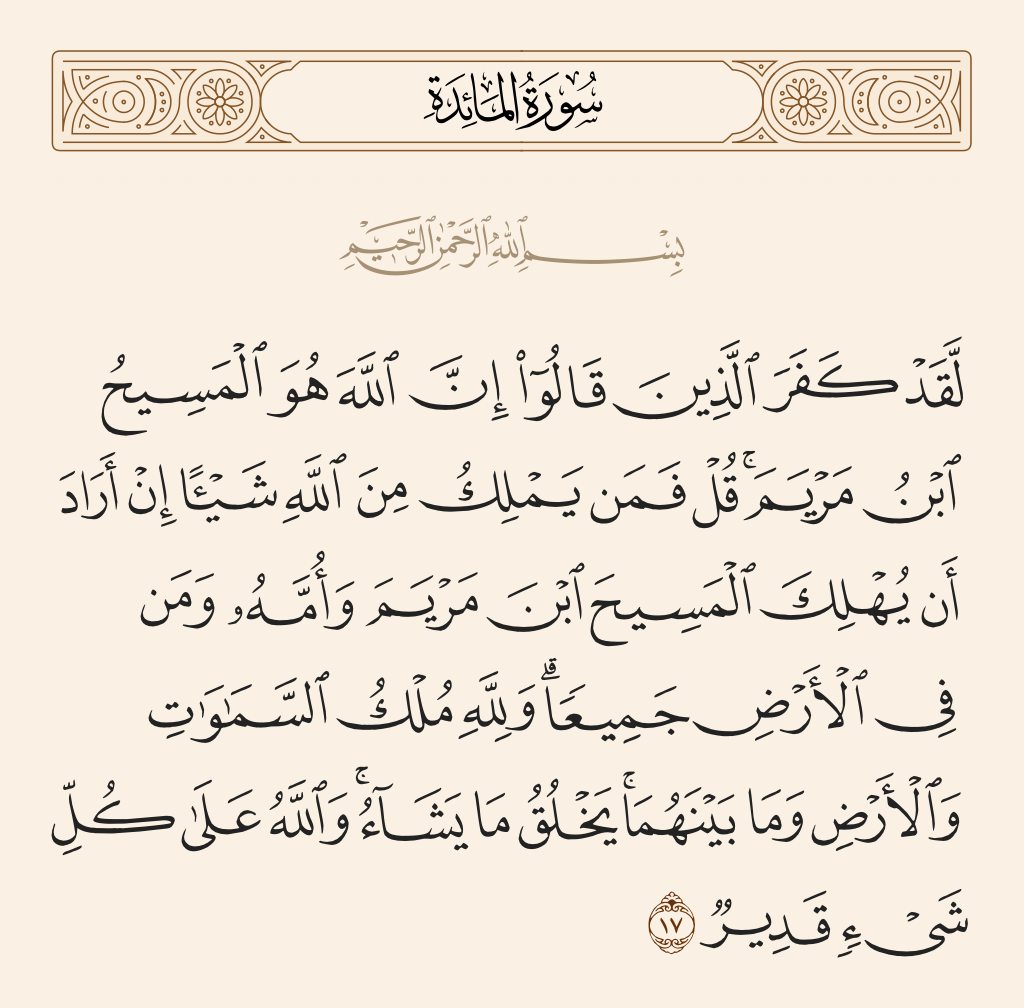Surat Al-Ma’idah Verse No. 17: Reading and listening
Translation of the verse 17 from Surah Al-Ma’idah : Number of verses 120 - - page 110 - Part 6.

﴾لَّقَدۡ كَفَرَ ٱلَّذِينَ قَالُوٓاْ إِنَّ ٱللَّهَ هُوَ ٱلۡمَسِيحُ ٱبۡنُ مَرۡيَمَۚ قُلۡ فَمَن يَمۡلِكُ مِنَ ٱللَّهِ شَيۡـًٔا إِنۡ أَرَادَ أَن يُهۡلِكَ ٱلۡمَسِيحَ ٱبۡنَ مَرۡيَمَ وَأُمَّهُۥ وَمَن فِي ٱلۡأَرۡضِ جَمِيعٗاۗ وَلِلَّهِ مُلۡكُ ٱلسَّمَٰوَٰتِ وَٱلۡأَرۡضِ وَمَا بَيۡنَهُمَاۚ يَخۡلُقُ مَا يَشَآءُۚ وَٱللَّهُ عَلَىٰ كُلِّ شَيۡءٖ قَدِيرٞ ﴿
[ المائدة: 17]
Surely, in disbelief are they who say that Allah is the Messiah, son of Maryam (Mary). Say (O Muhammad SAW): "Who then has the least power against Allah, if He were to destroy the Messiah, son of Maryam (Mary), his mother, and all those who are on the earth together?" And to Allah belongs the dominion of the heavens and the earth, and all that is between them. He creates what He wills. And Allah is Able to do all things.
English - Sahih International
They have certainly disbelieved who say that Allah is Christ, the son of Mary. Say, "Then who could prevent Allah at all if He had intended to destroy Christ, the son of Mary, or his mother or everyone on the earth?" And to Allah belongs the dominion of the heavens and the earth and whatever is between them. He creates what He wills, and Allah is over all things competent.
Tafheem-ul-Quran by Syed Abu-al-A'la Maududi
(5:17) Indeed those who said: 'Christ, the son of Mary, he is indeed God', disbelieved. *39 Say (O Muhammad!): 'Who could have overruled Allah had He so willed to destroy Christ, the son of Mary, and his mother, and all those who are on earth?' For to Allah belongs the dominion of the heavens and the earth and all that is between them; He creates what He wills. *40 Allah is All-Powerful.
Tafheem-ul-Quran by Syed Abu-al-A'la Maududi
*39). The original mistake committed by the Christians in declaring Jesus to be a combination of human and divine essences turned Jesus into a mystery for them, and the more the Christian scholars tried to solve this mystery by resorting to conjecture and rhetorical extravagance the more involved the whole matter became. Those who were more impressed by the humanity of Jesus stressed his being the son of God and considered him to be one of the three gods. Those who were more impressed by the divinity of Jesus considered him to be none other than God, stressing that he was the human incarnation of God, and worshipped him as God. Those who tried to strike a middle path spent all their efforts hammering out subtle verbal formulations of the Trinity that would allow people to consider the Messiah to be God and man at one and the same time, to affirm that God and the Messiah are independent and simultaneously constitute an inseparable whole (see Surah 4, nn. 212, 213, 215 above).
*40). This statement hints at the childishness of those who have been misled into believing that the Messiah himself is God either because of his miraculous birth or because of his flawless moral character or because of the miracles which he performed. The Messiah is merely a sign of the innumerable wonders of God's creation; a sign which somehow dazzled the eyes of those superficial people. Had their perception been wider they would have been able to see that there are even more inspiring examples of His creation and infinite power. If anything their attitude was indicative of the intellectual puerility of those who were so overawed by the excellence of a creature as to mistake him for the Creator. Those whose intelligence penetrates through the excellence of creatures, who look upon them merely as signs of the magnificent power of God, and who are led by such observations to a reinforcement of faith in the Creator are truly wise.